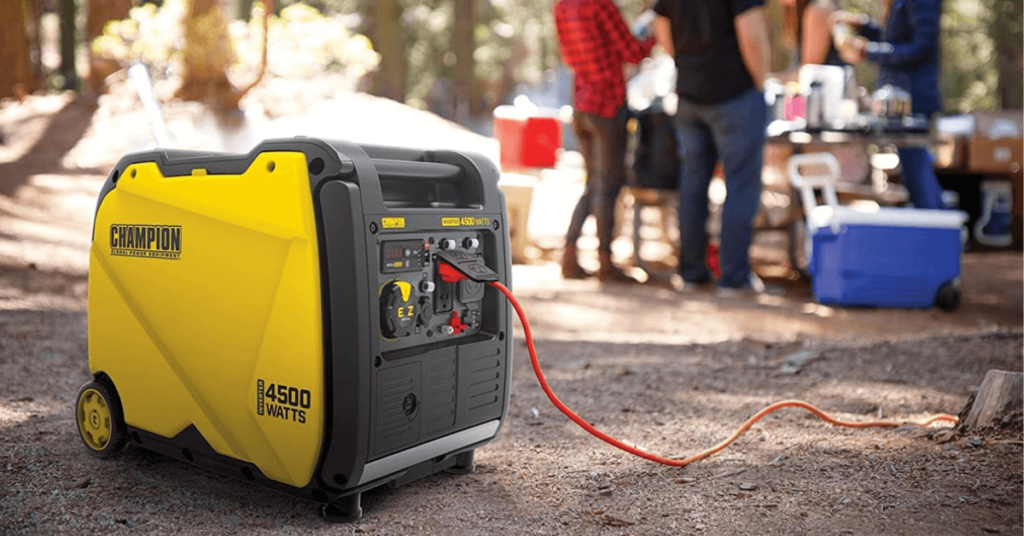Electric generators are essential tools during emergencies, providing a reliable source of backup power when the grid fails. Natural disasters, power outages, and other unforeseen events can all cause power disruptions, leaving homes and businesses without electricity. In such scenarios, electric generators play a crucial role in ensuring that the necessary equipment, appliances, and infrastructure stay operational.
This article discusses the benefits and importance of electric generators during emergencies, the types of emergencies where they are needed, features to consider when choosing an emergency generator, safety measures when using them during emergencies, common uses of electric generators during emergencies, and maintenance tips.
Benefits and Importance of Electric Generators for Emergencies:

The benefits and importance of electric generators during emergencies are numerous. One of the most significant advantages is that they provide reliable backup power during power outages caused by natural disasters or other events. When the grid fails, electric generators ensure that homes, businesses, and critical infrastructure, such as hospitals and emergency response centers, remain operational. This can be crucial for saving lives, preventing property damage, and maintaining essential services.
Another benefit of electric generators during emergencies is that they can provide peace of mind. Knowing that you have a backup power source that can keep your lights on, appliances running, and HVAC systems working during an outage can reduce stress and anxiety. This can be especially important for people who live in areas prone to power outages or who depend on electricity for medical equipment or other critical needs.
Types of Emergencies Where Electric Generators are Needed:
Electric generators are needed in various types of emergencies, including natural disasters, power grid failures, and equipment malfunctions. Natural disasters such as hurricanes, tornadoes, earthquakes, and floods can cause widespread power outages that can last for days or even weeks. During such events, electric generators can provide a reliable source of backup power for homes, businesses, and critical infrastructure.
Power grid failures caused by equipment failures or cyberattacks can also lead to widespread power outages. In such cases, electric generators can help keep essential services operational until the grid is restored.
Equipment malfunctions, such as failures of HVAC systems or other critical infrastructure, can also lead to power outages. In these cases, electric generators can provide temporary backup power until the necessary repairs are made.
Generator Fuel Efficiency: Tips for Saving Money and Reducing Carbon Footprint
Electric generators come in different types, sizes, and fuel sources. While these factors affect their performance and output, one of the most critical considerations is fuel efficiency. Generator fuel efficiency refers to the amount of fuel required to produce a certain amount of electricity or run for a specific period. Since fuel is the primary operating cost for generators, maximizing fuel efficiency is essential to save money and reduce your carbon footprint. In this article, we will explore various tips and strategies for improving generator fuel efficiency.
Types of Electric Generators: Understanding Their Pros and Cons
Electric generators are a popular choice for backup power, off-grid living, and outdoor activities. They come in different types, each with unique features, benefits, and drawbacks. Understanding the different types of electric generators can help you choose the best one for your needs and avoid costly mistakes. In this article, we will explore the most common types of electric generators, their advantages and disadvantages, and the applications they are best suited for.
The Importance of Generator Maintenance: Keeping Your Generator Running Smoothly
An electric generator is a complex machine that requires regular maintenance to function correctly and efficiently. Neglecting generator maintenance can lead to various problems, including reduced performance, increased fuel consumption, and even failure. Regular generator maintenance is essential to ensure its longevity, reliability, and optimal performance. In this article, we will discuss the importance of generator maintenance, the essential maintenance tasks, and the frequency of each task.
Portable Generator Safety: Tips for Safe and Responsible Use
Portable generators are a popular choice for outdoor activities, camping, and backup power. While they offer several benefits, including portability and convenience, they also pose various safety hazards if not used properly. Portable generator safety is crucial to prevent accidents, injuries, and property damage. In this article, we will discuss various safety tips and guidelines for using portable generators safely and responsibly.
Inverter Generator Technology: The Advantages and Applications
Inverter generator technology is a relatively new development in the electric generator industry that offers several advantages over traditional generators. Inverter generators are quieter, more fuel-efficient, and produce cleaner power than conventional generators. They are ideal for applications that require sensitive electronics or where noise and emissions are a concern. In this article, we will explore inverter generator technology, its advantages, applications, and limitations.
Features to Consider in Choosing an Emergency Electric Generator:
When choosing an emergency electric generator, several features need to be considered to ensure that you get the right one for your needs. One essential feature is the generator’s power output, which determines how much electrical load it can handle. The power output is measured in watts and can range from 1,000 watts for small portable generators to over 10,000 watts for large stationary generators.
Another critical feature to consider is the fuel source for the generator. Electric generators can be powered by gasoline, diesel, propane, or natural gas. Each fuel type has its advantages and disadvantages, such as cost, availability, and emissions.
The generator’s portability is another crucial feature to consider. If you need a generator that can be moved easily from one location to another, a portable generator is the best option. If you need a generator that can power your entire home or business, a stationary generator may be a better choice.
Safety Measures When Using Electric Generators During Emergencies:
Using electric generators during emergencies requires several safety measures to prevent accidents and injuries. One essential safety measure is to ensure that the generator is located in a well-ventilated area to prevent carbon monoxide buildup. Carbon monoxide is a colorless, odorless gas that can be lethal when inhaled in high concentrations.
Another crucial safety measure is to ensure that the generator is grounded correctly to prevent electric shocks. All electrical equipment, including generators, can pose a risk of electric shock if not grounded correctly.
In addition to the safety measures mentioned above, it is also important to follow some maintenance tips for your electric generator to ensure it is always ready for emergencies. Here are some essential maintenance tips:
Keep the generator clean and dry: Regularly clean the generator to prevent the accumulation of dust and dirt. If you live in a humid area, make sure to keep the generator dry and protected from moisture.
Check the oil level: Make sure to check the oil level of your generator before and after use. If the oil level is low, add more oil to prevent damage to the engine.
Change the oil regularly: Follow the manufacturer’s recommendation on when to change the oil. It is typically recommended to change the oil after every 50-100 hours of use.
Replace the air filter: Check the air filter of your generator and replace it if it is dirty. A dirty air filter can reduce the efficiency of the generator.
Check the fuel level and quality: Make sure to check the fuel level and quality of your generator before use. If the fuel is old or contaminated, it can cause damage to the engine.
Start the generator regularly: It is recommended to start the generator once a month to ensure it is in good working condition. This also helps prevent the buildup of stale fuel
Common Uses of Electric Generators During Emergencies:
During emergencies, electric generators can be used for various purposes such as powering essential appliances and medical equipment, providing heat or air conditioning, and powering communication devices. Here are some common uses of electric generators during emergencies:
Powering Essential Appliances: When the power goes out, electric generators can be used to power essential appliances like refrigerators, freezers, and sump pumps to prevent food spoilage and flooding.
Providing Heat or Air Conditioning: During extreme weather conditions, electric generators can provide heat or air conditioning to maintain a comfortable living environment.
Powering Communication Devices: In emergency situations, communication is crucial. Electric generators can power communication devices like radios, televisions, and cell phones to keep people informed and connected.
Medical Equipment: Electric generators can be used to power medical equipment like ventilators, oxygen concentrators, and dialysis machines during power outages.
Maintenance Tips for Electric Generators:
Regular maintenance of your electric generator is crucial to ensure its reliable performance during emergencies. Here are some maintenance tips to keep in mind:
Check the oil level regularly: Oil is the lifeblood of your generator’s engine, and running the engine with low oil levels can cause severe damage. Check the oil level before each use and add oil as needed.
Replace the oil and oil filter: Over time, oil can become contaminated with dirt and debris, and the oil filter can become clogged. Change the oil and oil filter every 50-100 hours of operation or as recommended by the manufacturer.
Clean the air filter: A dirty air filter can restrict airflow to the engine, causing it to run poorly. Clean or replace the air filter every 50-100 hours of operation or as recommended by the manufacturer.
Check the fuel system: Make sure the fuel tank is clean and free of water, and the fuel lines and filter are in good condition. Stale fuel can cause carburetor problems, so if you haven’t used the generator in a while, drain the fuel tank and carburetor before refilling.
Test the battery: If your generator has an electric starter, make sure the battery is fully charged and in good condition. Test the battery periodically and replace it if necessary.
Inspect the spark plug: A fouled or worn spark plug can cause your generator to run poorly or not at all. Check the spark plug every 50-100 hours of operation and replace it if necessary.
Keep the generator clean: Dirt and debris can clog the engine’s cooling system, reducing its effectiveness. Keep the generator clean and free of debris, and check the cooling system periodically to ensure it’s working properly.
By following these maintenance tips, you can help ensure that your electric generator is ready to go when you need it most.
FAQs
What types of emergencies require an electric generator?
Electric generators can be useful in any emergency where there is a power outage, including severe weather events, natural disasters, and blackouts caused by power grid failures.
What features should I consider when choosing an electric generator for emergencies?
When choosing an electric generator for emergencies, consider the generator’s wattage, fuel type, runtime, portability, and noise level. It’s also important to consider any specific needs you may have, such as medical equipment that requires power.
How can I safely use an electric generator during an emergency?
Make sure to read and follow the manufacturer’s instructions carefully, and never operate the generator indoors or in a confined space. Keep the generator at least 20 feet away from your home or any other buildings, and never touch the generator with wet hands or while standing in water.
How often should I perform maintenance on my emergency generator?
It’s important to perform regular maintenance on your emergency generator to ensure that it will be ready when you need it. This includes regular oil changes, filter replacements, and battery checks. It’s also a good idea to start the generator and run it for a few minutes every few months to keep it in good working order.
Conclusion
In conclusion, electric generators are essential during emergencies as they provide backup power when the main grid fails. They offer a reliable source of power for homes, businesses, hospitals, and other critical facilities. With different types of generators available in the market, it is important to select the one that best fits your needs based on factors such as power output, fuel type, and portability.
It is also crucial to ensure that safety measures are observed when operating a generator and that regular maintenance is performed to extend its lifespan and ensure reliable performance during emergencies. By following these guidelines, you can have peace of mind knowing that you are well prepared for any unexpected power outage.




